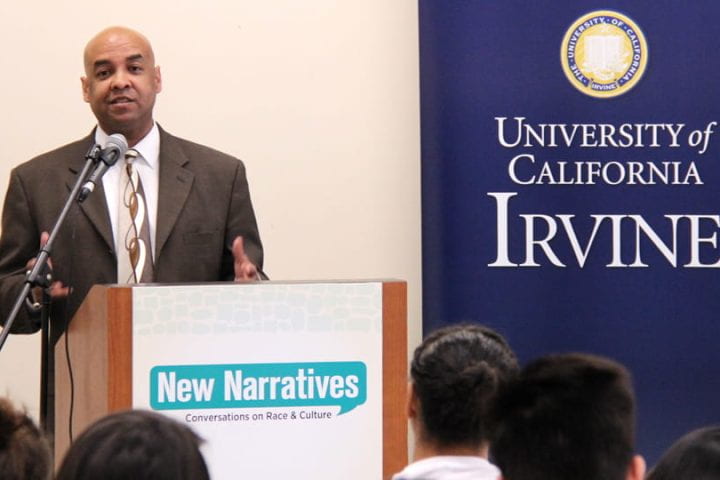Cultural climate change
BART police chief discusses challenges of taking over agency in wake of infamous Oscar Grant killing

Kenton Rainey’s answer to “What do you want to be when you grow up?” was always the same: a police officer. Rainey grew up on Chicago’s South Side, where relations between law enforcement and community members were fraught with tension. He had a vision of a different kind of officer, one who collaborates with residents on crime reduction and creates change from the inside.
Today Rainey is chief of police for Bay Area Rapid Transit, overseeing the safety of 400,000 daily commuters. He joined the force after the fatal 2009 shooting of an unarmed black man by a white BART officer – a controversial incident that’s the basis of the 2013 film “Fruitvale Station.”
Rainey recently visited UC Irvine as part of “New Narratives: Conversations on Identities & Culture,” a yearlong series of events promoting healthy intergroup communication and cooperation that’s sponsored by the Office of the Vice Chancellor for Student Affairs.
His talk covered the challenges of taking over an embattled police department and the importance of law enforcement and the public working together to address crime and social disorder.
“When police are estranged from communities they serve, that’s when tasks become impossible,” Rainey said to a packed crowd in the Cross-Cultural Center’s Dr. Joseph L. White Conference Room.
He was introduced by Thomas Parham, vice chancellor for student affairs, who noted parallels between their journeys as African American men in positions of power and authority.
“We were determined to get inside the system and change it instead of fighting from the outside,” Parham said. “In the black community, we don’t deplore law enforcement; we deplore racist policing and police brutality.”
Early on New Year’s Day 2009, 22-year-old Oscar Grant was shot in the back by BART officer Johannes Mehserle on the Fruitvale Station platform in Oakland, Calif. Bystanders captured the sequence of events on digital video and cellphone cameras – footage that sparked a public outcry.
Mehserle left the force and eventually spent 11 months in prison for involuntary manslaughter. The BART chief of police also resigned, and Rainey was brought in to stabilize the agency and restore its reputation.
“It’s hard for me to face [Grant’s family],” Rainey told the UC Irvine audience. “My profession killed their kid.”
He believes there is no room for bias in policing and implemented cultural awareness training for his officers, teaching ways to connect with the Bay Area’s diverse residents.
“Our job is not just about giving out tickets and taking people to jail,” Rainey said. “We’re helping democracy grow and flourish by solving problems with the community and making it safe for all.”
The “New Narratives” series of speakers, films, panel workshops and other activities continues through the academic year, focusing on topics related to race, gender, sexual orientation, religious affiliation and other social identities.

